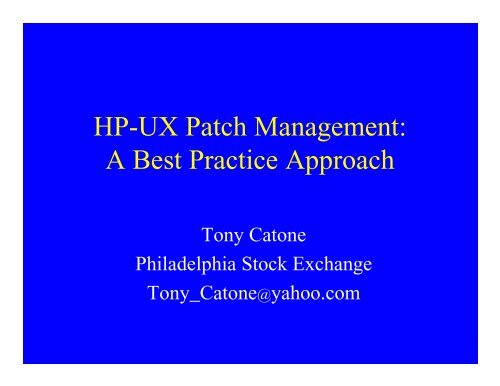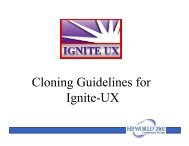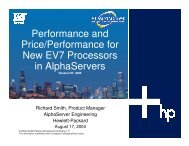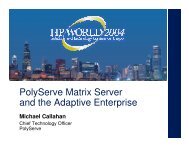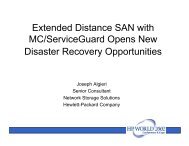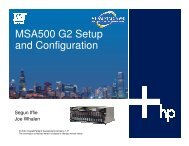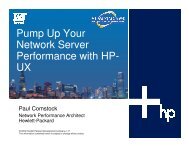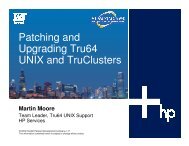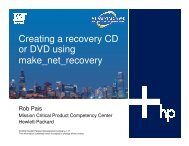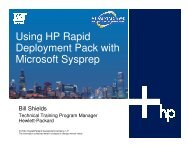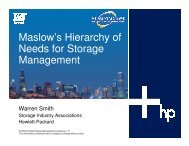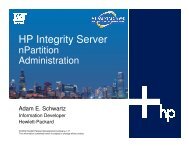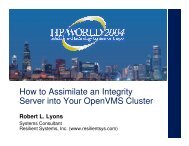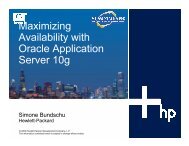HP-UX Patch Management: A Best Practice Approach - OpenMPE
HP-UX Patch Management: A Best Practice Approach - OpenMPE
HP-UX Patch Management: A Best Practice Approach - OpenMPE
Create successful ePaper yourself
Turn your PDF publications into a flip-book with our unique Google optimized e-Paper software.
<strong>HP</strong>-<strong>UX</strong> <strong>Patch</strong> <strong>Management</strong>:<br />
A <strong>Best</strong> <strong>Practice</strong> <strong>Approach</strong><br />
Tony Catone<br />
Philadelphia Stock Exchange<br />
Tony_Catone@yahoo.com
Agenda<br />
• Discuss different patch approaches.<br />
• Problems with Reactive approach.<br />
• Benefits of Proactive approach.<br />
• Case Studies.<br />
• Process Improvements.<br />
• Minimizing Reboots.<br />
• Making the Business Case.
<strong>Patch</strong> Strategies<br />
• Reactive - apply patches only when<br />
recommended by vendor support.<br />
• Extension Media - apply on an annual or<br />
biannual basis.<br />
• Proactive - apply patches on a scheduled,<br />
periodic basis to avoid encountering faults<br />
already corrected by the vendor.
Problems with Reactive<br />
<strong>Approach</strong><br />
• Slows the support process, since the first<br />
step to any resolution will be to check for<br />
and install latest vendor patches.<br />
• Vendors, especially third-party ones, are not<br />
always able to identify all patches<br />
applicable to a problem.<br />
• You’re only as good as the researcher<br />
you’re working with.
Challenges in Implementing<br />
Proactive <strong>Approach</strong><br />
• Limitations of reactive patching may have<br />
left a “patching is bad” attitude among<br />
management.<br />
• Vendor recommendations are Laodicean at<br />
best.<br />
• Need to collect statistics and data to build<br />
the business case!!!
Case Study 1: FDDI Problem<br />
• 98/6/19, <strong>HP</strong> T-600 running <strong>HP</strong>-<strong>UX</strong> 10.20.<br />
• Purely reactive patching model, no patches<br />
applied unless explicitly instructed from <strong>HP</strong><br />
• FDDI card loses its network configuration,<br />
must have IP number and netmask reset by<br />
Operations.<br />
• Each interruption leaves the Business<br />
Department unable to process financials.
CS 1: FDDI Problem (continued)<br />
• Open call with <strong>HP</strong> ITRC.<br />
• At their recommendation, replace FDDI<br />
cable and move connection to a different<br />
port.<br />
• Two weeks later, problem reappears and<br />
Operations corrects.<br />
• <strong>HP</strong> replaces FDDI card during next<br />
scheduled maintenance, one week later.
CS 1: FDDI Problem (continued)<br />
• One week later, problem reoccurs.<br />
• Contact <strong>HP</strong>.<br />
– ITRC recommends applying a specific set of<br />
FDDI patches.<br />
– <strong>Patch</strong>es are scheduled and applied during next<br />
maintenance window, 1 week delay.<br />
• Problem reoccurs 1.5 weeks later.
CS 1: FDDI Problem (continued)<br />
• Issue now in escalation to internal top-level<br />
management and with <strong>HP</strong>.<br />
• ITRC continues searching Technical<br />
Knowledge Base with no new results.<br />
• Two more occurrences, impacting Business<br />
Department during working hours each<br />
time.
CS 1: FDDI Problem (continued)<br />
• In brainstorming session to compare what<br />
might be common across incidents, a SAM<br />
probing of disks and file systems was<br />
recalled in almost half the occurrences.<br />
• Admins use new information to continue<br />
searching ITRC Technical Knowledge Base<br />
• Most similar Problem Description detailed a<br />
SAM hang with Nike arrays.
CS 1: FDDI Problem (continued)
CS 1: FDDI Problem (continued)
CS 1: FDDI Problem (continued)<br />
• Admins confirm there is a Nike array on<br />
T600 with same minor number as FDDI<br />
card.<br />
• Admins append previous information to<br />
open call and ask ITRC if this is the<br />
problem and the workaround.
CS1- FDDI Problem (continued)<br />
• ITRC responds back within two hours.<br />
• This is the problem.<br />
• This problem was corrected by<br />
PHKL_13044, released 97/11/19.<br />
• PHKL_13044 requires PHKL_11938.<br />
• PHKL_13044 et. al installed and tested on<br />
98/8/13.<br />
• Problem resolved after nearly 2 months.
CS1 - Lessons Learned<br />
• Problem was consistently reproducible once<br />
understood.<br />
• Despite escalation to vendor, ITRC was<br />
unable to identify proper patch until<br />
problem was internally identified.<br />
• Disruption of the Business Department over<br />
the span of two months would have been<br />
avoided by a proactive patch strategy.
Case Study 2: Oracle Shell<br />
• 98/9/12, K-460’s running <strong>HP</strong>-<strong>UX</strong> 10.20.<br />
• Extension media patch model, media<br />
applied twice annually.<br />
• Autosys, a critical third-party application,<br />
requires PHCO_15643 or higher to support<br />
new version of application.<br />
• New version is required to deploy 4,000<br />
new batch processes to meet business needs.
CS 2: Oracle Shell (continued)<br />
• Latest extension media is applied to servers<br />
successfully.<br />
• System test scripts are executed<br />
successfully.<br />
• Days later, in course of normal operations,<br />
DBAs discover that Oracle installer<br />
(orainst) no longer successfully completes<br />
Oracle relinks (Oracle 7.x.x and 8.x).
CS 2: Oracle Shell (continued)<br />
• DBAs perform days of in-house testing with<br />
different versions of Oracle on different<br />
systems to isolate problem.<br />
• DBAs notify IT of the problem.<br />
• DBAs and Admins trace potential problem<br />
to new release of Posix shell, /usr/bin/sh.<br />
• Oracle recreates problem in their lab to<br />
confirm.
CS 2: Oracle Shell (continued)<br />
• Extension media version<br />
– PHCO_16370 - 98/09/11, /usr/bin/sh Revision: 78.16.1.41<br />
• Autosys required version<br />
– PHCO_15643 - 98/06/22, /usr/bin/sh Revision: 78.16.1.34<br />
• Current version before patching<br />
– PHCO_13661 - 98/01/16, /usr/bin/sh Revision: 78.16.1.26<br />
• Internal Oracle development version<br />
– PHCO_10718 - 97/04/24, /usr/bin/sh Revision: 78.16.1.23
CS 2: Oracle Shell (continued)<br />
• /usr/bin/sh revision history<br />
– PHCO_16370 - 98/09/11, /usr/bin/sh Revision: 78.16.1.41<br />
– PHCO_16063 - 98/08/04, /usr/bin/sh Revision: 78.16.1.39<br />
– PHCO_15643 - 98/06/22, /usr/bin/sh Revision: 78.16.1.34<br />
– PHCO_14180 - 98/02/27, /usr/bin/sh Revision: 78.16.1.30<br />
– PHCO_13661 - 98/01/16, /usr/bin/sh Revision: 78.16.1.26<br />
– PHCO_13359 - 98/01/15, /usr/bin/sh Revision: 78.16.1.25<br />
– PHCO_10718 - 97/04/24, /usr/bin/sh Revision: 78.16.1.23
CS 2: Oracle Shell (continued)<br />
• Admins find workaround by copying old sh<br />
from patch save directory, then restoring<br />
current shell, when orainst execution is<br />
needed.<br />
• TAR is opened with Oracle support.<br />
• <strong>HP</strong> ITRC support call is opened.<br />
• DBAs express dissatisfaction with<br />
workaround, as it requires IT intervention.
CS 2: Oracle Shell (continued)<br />
• 3 weeks later, <strong>HP</strong> releases patch to correct<br />
problem.<br />
• Root cause: Posix shell dumps core when<br />
non-interpreter scripts (i.e., scripts without<br />
a #! line in the beginning) are executed<br />
through “sh -c”.<br />
• PHCO_16734 tested and deployed on<br />
98/11/08.
CS 2: Lessons Learned<br />
• Third party software (in this case, Autosys)<br />
may require prerequisite installation of <strong>HP</strong>-<br />
<strong>UX</strong> patches.<br />
• The required patches may effect the<br />
behavior of other software packages (in this<br />
case, Oracle).
CS 2: Lessons Learned<br />
(continued)<br />
• If all Posix shell patches had been installed<br />
as released, incremental backout may have<br />
resolved the issue.<br />
• If smaller bundles of patches were installed<br />
in more frequent intervals, problem<br />
isolation would have been much more<br />
expeditious!!!
Case Study 3: Autosys<br />
• K- and T- class servers running <strong>HP</strong>-<strong>UX</strong><br />
10.20.<br />
• Mixture of extension media and reactive<br />
patching. Extension media applied 1-2<br />
times annually on rotating schedule.<br />
• New version of Autosys is required to<br />
deploy 4,000 new batch processes to meet<br />
business needs.
CS 3: Autosys (continued)<br />
• Pre-release binaries of Autosys binaries<br />
dump core on most but not all systems.<br />
• All systems have prerequisite <strong>HP</strong>-<strong>UX</strong><br />
patches, as dictated by Autosys vendor,<br />
Platinum Technologies.<br />
• Issue resides in support for two months,<br />
with new builds of binaries tested as they<br />
are produced by Platinum.
CS 3: Autosys (continued)<br />
• Binaries of latest version, Build 41,<br />
continue to dump core.<br />
• Platinum unable to reproduce problem<br />
internally.<br />
• Issue goes into escalation. Platinum<br />
acknowledges this is their issue.<br />
• Daily conference calls with Platinum to<br />
resolve the “Platinum binary issue”.
CS 3: Autosys (continued)<br />
• Admins renew suggestion to recore a test<br />
system with <strong>HP</strong>-<strong>UX</strong> 10.20 and all latest<br />
patches, via Custom <strong>Patch</strong> Manager.<br />
• With nothing to lose, IT <strong>Management</strong><br />
approves the allocation of resources.<br />
• Platinum binaries work perfectly on test<br />
system!
CS 3: Lessons Learned<br />
• Third party software (in this case, Autosys)<br />
may require prerequisite installation of <strong>HP</strong>-<br />
<strong>UX</strong> patches.<br />
• Third party vendors cannot be relied upon<br />
to accurately elucidate all their products’<br />
<strong>HP</strong>-<strong>UX</strong> OS and patch level dependencies!!!
Case Study 4: Firewall-1<br />
• D-370 running <strong>HP</strong>-<strong>UX</strong> 10.20.<br />
• Biannual Extension Media patching model.<br />
• Internal firewall running Checkpoint<br />
Firewall-1 version 3.0.<br />
• Latest Extension Media applied<br />
successfully.<br />
• Firewall-1 now dumps core on startup.
CS 4: Firewall-1 (continued)<br />
• Reinstall <strong>HP</strong>-<strong>UX</strong> 10.20 and Extension<br />
Media from new CDs to new disk<br />
• Firewall-1 still core dumps<br />
• Reinstall <strong>HP</strong>-<strong>UX</strong> 10.20 with no patches<br />
• Firewall-1 starts as normal<br />
• Entire process took over 24 hours, Saturday<br />
morning to Sunday morning!
CS 4: Firewall-1 (continued)<br />
• <strong>HP</strong> ITRC responds Monday morning.<br />
• Problem is a known issue, with an adb<br />
script workaround.<br />
• One month later, workaround is deployed<br />
and tested.<br />
• Issue resolved.
CS 4: Lessons Learned<br />
• Biannual application of Extension Media<br />
results in simultaneous installation of<br />
hundreds of patches.<br />
• Isolating which patches cause a behavior<br />
change is difficult in this scenario.<br />
• Applying smaller sets of patches more<br />
frequently would allow better diagnostics<br />
and immediate backout.
New <strong>Patch</strong> <strong>Approach</strong><br />
• Apply patches on a monthly basis.<br />
• Use Custom <strong>Patch</strong> Manager to build patch<br />
depots each month.<br />
• Take a patch unless there is a specific<br />
reason to reject it.<br />
• Month by month, average number of<br />
patches is on the order of two dozen.
Custom <strong>Patch</strong> Manager<br />
• Encapsulates all information from<br />
– ftp://us-ffs.external.hp.com/hp-ux_patches/catalog<br />
– ftp://us-ffs.external.hp.com/export/patches/hp-ux_obs_patch_list<br />
• Performs dependency analysis!!!<br />
• Performs conflict analysis.<br />
• Run cpm_collect.sh script, upload *.fs file,<br />
and download result script to download<br />
patches and build depot.
Dependency Analysis<br />
• PHCO_16734 requires PHCO_10719<br />
• PHCO_10719 requires PHCO_10718<br />
• PHCO_10718 requires PHCO_10719<br />
• Complete set = {PHCO_10718,<br />
PHCO_10719, PHCO_16734}<br />
• Never remove a patch without knowing<br />
what other patches depend upon it!!!
ITRC Main Menu
CPM Main Screen
CPM Main Menu Options
CPM <strong>Patch</strong> Analysis Menu
CPM Default Options
CPM Candidate <strong>Patch</strong> Summary
CPM Display of Candidate<br />
<strong>Patch</strong>es (abbreviated)
CPM Select All Options
CPM Selected <strong>Patch</strong> List
CPM Analyze Option
CPM <strong>Patch</strong> Conflict Report
CPM Package <strong>Patch</strong>es
Conditions to Check Pre- and<br />
Post-<strong>Patch</strong>ing<br />
• All patches are installed and configured<br />
– swlist -l fileset -a state | egrep -v ‘^#|configured’<br />
• A kernel can be successfully built<br />
– /usr/lbin/sysadm/system_prep -s system<br />
– /usr/sbin/mk_kernel -s system<br />
• Backup /var/adm/sw and run cleanup if<br />
additional space is required (pre-patch only)
Minimize Reboots<br />
• Normally, the swremove of kernel patches<br />
will force a reboot.<br />
• Since we are about to install a depot with<br />
kernel patches, we would have two reboots,<br />
one for swremove and one for swinstall.<br />
• On K- and T-class servers, a reboot can take<br />
45 minutes or more!!!
Minimize Reboots (continued)<br />
• swremove behavior is controlled by two<br />
IPD fileset attributes<br />
– is_kernel=true<br />
– is_reboot=true<br />
• Query attributes using swlist<br />
– /usr/sbin/swlist -v PHKL_20327 \<br />
| egrep ‘is_kernel|is_reboot’
Minimize Reboots (continued)<br />
• Use swmodify to set both attributes to false<br />
– swmodify -a is_kernel=false \<br />
-a is_reboot=false PHKL_20327<br />
• swremove will now remove kernel patch<br />
filesets without forcing a reboot.
Minimize Reboots (continued)<br />
• <strong>Patch</strong> will still exist in currently running<br />
kernel<br />
– what /stand/vmunix | grep PHKL_20327<br />
• swinstall will build new kernel after depot<br />
installation, without removed patches!!!<br />
• Same process applies to any filesets<br />
requiring reboot, including Predictive/<strong>UX</strong>.
Process Improvements<br />
• Mirror the <strong>HP</strong>-<strong>UX</strong> patch depot with wget<br />
– ftp://ftp.gnu.org/pub/gnu/wget/<br />
• Complete mirror will take approximately 12<br />
GB disk space.<br />
• Copying patches from local mirror is many<br />
orders of magnitude faster than ftp over the<br />
Internet!!!
Process Improvements (cont’d)<br />
• Build local depots for each server.<br />
• Test each depot before installation and<br />
remove any patches that will fail pre-install.<br />
• Keeps depot size smaller for faster<br />
installation, especially on older machines.<br />
• Allows all team members to look for<br />
consistent report, i.e. “23 of 23 Ready”.
Configuration <strong>Management</strong><br />
ts01 ts02 ts03 ts09<br />
PHCO_18269:<strong>Patch</strong> Description: s700_800 10.20 libc locale methods cumulative patch PHCO_18269 PHCO_18269 PHCO_18269 PHCO_18269<br />
PHCO_19534:<strong>Patch</strong> Description: s700_800 10.20 <strong>HP</strong>DPS cumulative w/ new printer support PHCO_19534 PHCO_19534 PHCO_19534 PHCO_19534<br />
PHCO_20018:<strong>Patch</strong> Description: s700_800 10.20 ksh(1) cumulative patch PHCO_20018 PHCO_20018 PHCO_20018 PHCO_20018<br />
PHCO_20060:<strong>Patch</strong> Description: s800 10.01-[12]0 envd(1M) cumulative patch PHCO_20060 PHCO_20060 PHCO_20060 PHCO_20060<br />
PHCO_20098:<strong>Patch</strong> Description: s700_800 10.20 libc cumulative patch PHCO_20098 PHCO_20098 PHCO_20098 PHCO_20098<br />
PHCO_20220:<strong>Patch</strong> Description: s700_800 10.X Year 2000 <strong>HP</strong>-<strong>UX</strong> Application <strong>Patch</strong> Tool PHCO_20220 PHCO_20220 PHCO_20220 PHCO_20220<br />
PHKL_19167:<strong>Patch</strong> Description: s800 10.20 LVM cumulative patch PHKL_19167 PHKL_19167 PHKL_19167 PHKL_19167<br />
PHKL_20063:<strong>Patch</strong> Description: s800 10.20 stape and tape2 cumulative patch PHKL_20063 PHKL_20063 PHKL_20063 PHKL_20063<br />
PHKL_20069:<strong>Patch</strong> Description: s800 10.20 Correction for 4-way MP PHKL_20069 PHKL_20069 PHKL_20069 PHKL_20069<br />
PHKL_20118:<strong>Patch</strong> Description: s800 10.20 VxFS FS hang and file I/O performance fix PHKL_20118 PHKL_20118 PHKL_20118 PHKL_20118<br />
PHKL_20327:<strong>Patch</strong> Description: s800 10.20 Handle more devices, fixes system hang PHKL_20327 PHKL_20327 PHKL_20327 PHKL_20327<br />
PHNE_20091:<strong>Patch</strong> Description: s700_800 10.20 NFS/NIS cumulative megapatch PHNE_20091 PHNE_20091 PHNE_20091 PHNE_20091<br />
PHSS_14980:<strong>Patch</strong> Description: s800 10.20 PDCINFO patch version A.02.24 PHSS_14980 PHSS_14980 PHSS_14980 PHSS_14980<br />
PHSS_18695:<strong>Patch</strong> Description: s700_800 10.X OV OB3.00 patch - CC packet PHSS_18695 PHSS_18695 PHSS_18695 PHSS_18695<br />
PHSS_18699:<strong>Patch</strong> Description: s700_800 10.X OV OB3.00 patch - SAP packet PHSS_18699 PHSS_18699 PHSS_18699 PHSS_18699<br />
PHSS_19009:<strong>Patch</strong> Description: s700_800 10.X OV OB3.00 patch - EMC packet PHSS_19009 PHSS_19009 PHSS_19009 PHSS_19009<br />
PHSS_19256:<strong>Patch</strong> Description: s700_800 10.20 Xserver cumulative patch (ACE 199912) PHSS_19256 PHSS_19256 PHSS_19256 PHSS_19256<br />
PHSS_19257:<strong>Patch</strong> Description: s700_800 10.20 3D Common Runtime patch (ACE 199912) PHSS_19257 PHSS_19257 PHSS_19257 PHSS_19257<br />
PHSS_19258:<strong>Patch</strong> Description: s700_800 10.20 PEX 5.1/Starbase/Hardcopy Runtime patch PHSS_19258 PHSS_19258 PHSS_19258 PHSS_19258<br />
PHSS_19259:<strong>Patch</strong> Description: s700_800 10.20 Starbase Development, Hardcopy Dev patch PHSS_19259 PHSS_19259 PHSS_19259 PHSS_19259<br />
PHSS_19260:<strong>Patch</strong> Description: s700_800 10.20 PEX 5.1 Development patch PHSS_19260 PHSS_19260 PHSS_19260 PHSS_19260<br />
PHSS_19264:<strong>Patch</strong> Description: s700_800 10.20 OpenGL 1.1 Developers patch PHSS_19264 PHSS_19264 PHSS_19264 PHSS_19264<br />
PHSS_20006:<strong>Patch</strong> Description: s800 10.20 STM panic, disk_em,diagmond,tlscsidev PHSS_20006 PHSS_20006 PHSS_20006 PHSS_20006<br />
PHSS_20083:<strong>Patch</strong> Description: s700_800 10.X OV OB3.00 patch - CS packet PHSS_20083 PHSS_20083 PHSS_20083 PHSS_20083<br />
PHSS_20085:<strong>Patch</strong> Description: s700_800 10.X OV OB3.00 patch - CORE packet PHSS_20085 PHSS_20085 PHSS_20085 PHSS_20085
Configuration <strong>Management</strong><br />
ts01 ts02 ts03 ts09<br />
s700_800 10.20 Cumulative SAM/ObAM <strong>Patch</strong><br />
PHCO_19046 PHCO_19046 PHCO_19046 PHCO_19046 PHCO_19046<br />
s700_800 10.20 Euro EBCDIC/PC converter tables (ACE 199912) PHCO_19780 PHCO_19780 PHCO_19780 PHCO_19780 PHCO_19780<br />
s700_800 10.20 ISO8859-15 converter tables (ACE 199912) PHCO_19781 PHCO_19781 PHCO_19781 PHCO_19781 PHCO_19781<br />
s700_800 10.20 m ksf/insf(1M) cumulative patch (ACE 199912) PHCO_19783 PHCO_19783 PHCO_19783 PHCO_19783 PHCO_19783<br />
s700_800 10.20 ioinitrc cumulative patch (ACE 199912) PHCO_19784 PHCO_19784 PHCO_19784 PHCO_19784 PHCO_19784<br />
s700_800 10.20 Year 2000 cumulative cron/at/crontab patch PHCO_19985 PHCO_19985 PHCO_19985 PHCO_19985 PHCO_19985<br />
s700_800 10.20 ITE_* terminfo files patch<br />
PHCO_20023 PHCO_20023 PHCO_20023 PHCO_20023 PHCO_20023<br />
s700_800 10.20 /sbin/init.d/savecore patch (ACE 199912) PHCO_20099 PHCO_20099 PHCO_20099 PHCO_20099 PHCO_20099<br />
s700_800 10.X q4 patch version A.11.10c<br />
PHCO_20261 PHCO_20261 PHCO_20261 PHCO_20261 PHCO_20261<br />
s700_800 10.20 fsck_hfs(1M) cum ulative patch<br />
PHCO_20330 PHCO_20330 PHCO_20330 PHCO_20330 PHCO_20330<br />
s700_800 10.20 pax(1) cum ulative patch<br />
PHCO_20388 PHCO_20388 PHCO_20388 PHCO_20388 PHCO_20388<br />
s700_800 10.20 quota(1) cumulative patch<br />
PHCO_20429 PHCO_20429 PHCO_20429 PHCO_20429 PHCO_20429<br />
s700_800 10.20 libc cumulative patch<br />
PHCO_20441 PHCO_20441 PHCO_20441 PHCO_20441 PHCO_20441<br />
s700_800 10.20 NFS diskless client kernel patch (ACE199912) PHKL_20126 PHKL_20126 PHKL_20126 PHKL_20126 PHKL_20126<br />
s800 10.20 Advanced VxFS B.10.20 cumulative patch PHKL_20356 PHKL_20356 PHKL_20356 PHKL_20356 PHKL_20356<br />
s800 10.20 Advanced VxFS B.10.20 cumulative patch PHKL_20358 PHKL_20358 PHKL_20358 PHKL_20358 PHKL_20358<br />
s800 10.20 VxFS: fix for FS hang and file I/O enhancement PHKL_20360 PHKL_20360 PHKL_20360 PHKL_20360 PHKL_20360<br />
s800 10.20 LOFS cum ulative patch PHKL_20483 PHKL_20483 PHKL_20483 PHKL_20483 PHKL_20483<br />
s800 10.20 stape and tape2 cum ulative patch PHKL_20509 PHKL_20509 PHKL_20509 PHKL_20509 PHKL_20509<br />
s700_800 10.X NTP timeservices upgrade plus utilities PHNE_19710 PHNE_19710 PHNE_19710 PHNE_19710 PHNE_19710<br />
s700_800 10.20 HSC 100BT lan cum ulative patch PHNE_19946 PHNE_19946 PHNE_19946<br />
s700_800 10.20 NFS Kernel General Rel & Perf <strong>Patch</strong> PHNE_20021 PHNE_20021 PHNE_20021 PHNE_20021 PHNE_20021<br />
s700_800 10.20 <strong>HP</strong>-VUE to CDE Migration Tools Nov97 <strong>Patch</strong><br />
PHSS_12887 PHSS_12887<br />
s700_800 10.20 sched.m odels cum ulative patch (ACE 199912) PHSS_19789 PHSS_19789 PHSS_19789 PHSS_19789 PHSS_19789<br />
s700_800 10.20 X11R5/Motif1.2 DevKit OCT99 Periodic <strong>Patch</strong> PHSS_19961 PHSS_19961 PHSS_19961 PHSS_19961 PHSS_19961<br />
s700_800 10.20 X11R6/Motif1.2 DevKit OCT99 Periodic <strong>Patch</strong> PHSS_19962 PHSS_19962 PHSS_19962 PHSS_19962 PHSS_19962<br />
s700_800 10.20 X/Motif Runtim e OCT99 Periodic <strong>Patch</strong> PHSS_19963 PHSS_19963 PHSS_19963 PHSS_19963 PHSS_19963<br />
s700_800 10.X ld(1) and som tools cumulative patch<br />
PHSS_20058 PHSS_20058 PHSS_20058 PHSS_20058 PHSS_20058
Making the Business Case<br />
Hours of downtime<br />
180<br />
160<br />
140<br />
120<br />
100<br />
80<br />
60<br />
40<br />
20<br />
0<br />
Quarter 1, 1997 Quarter 1, 1998 Quarter 1, 1999<br />
• Document case studies<br />
• Establish metrics<br />
• Keep accurate uptime<br />
statistics<br />
• Track change over<br />
time<br />
• Persevere!!!


